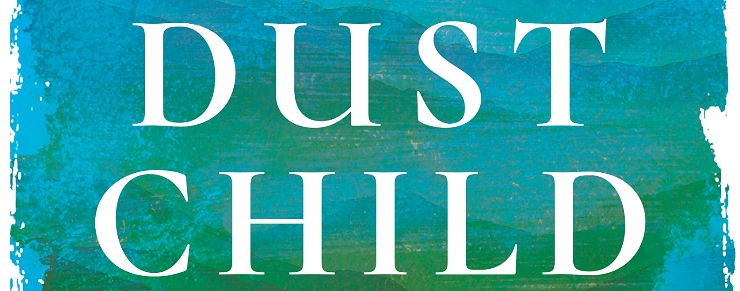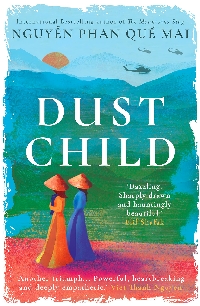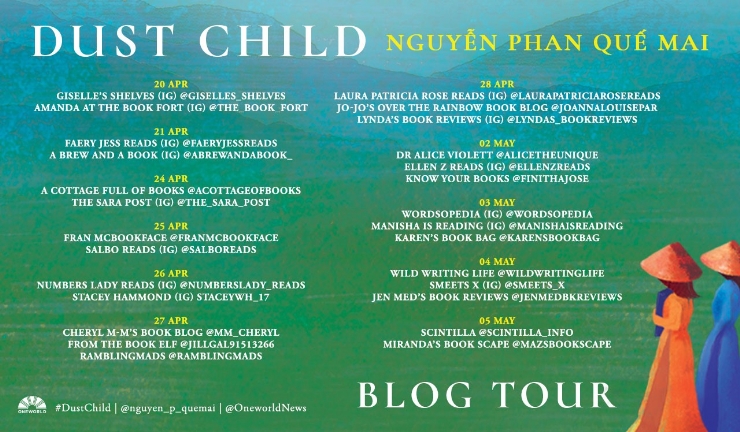Blog tour: Dust Child by Nguyễn Phan Quế Mai

This post is part of a blog tour organised by Random Things Blog Tours. I received a free copy of the book in return for an honest review.
‘In 1969, two sisters from rural Việt Nam leave their parents’ home to find work in Sài Gòn.
‘Caught up in the war that is blazing through their country they, like many other young Việtnamese women, are employed as hostesses in a bar frequented by American GIs.
‘Soon they are forced to accept that their own survival, and that of their family back home, might mean compromising the values they have always held dear.
‘As the fighting moves closer to the city, the elder sister, Trang, begins a romance with a young American helicopter pilot.
‘Decades later, two men wander the streets and marketplaces of modern Sài Gòn. Phong is a “Dust Child” – the son of a Black American soldier and a Việtnamese woman, abandoned by his mother and ostracised all his life – and is looking for his parents and through them a way out of Việt Nam.
‘Meanwhile war veteran Dan returns with his wife Linda, hoping to ease the PTSD that has plagued him for decades.
‘Neither of them can escape the shadow of decisions made during a time of desperation.’

Dust Child, by Nguyễn Phan Quế Mai, alternates between the narratives of three characters in very different circumstances: Trang, Dan, and Phong.
In 1969, 18-year-old Trang, along with her younger sister Quỳnh, moves to Sài Gòn. The pair soon find out that working as bar girls entails more than just sitting with American GIs while sipping “Sài Gòn Tea”. Even so, Trang finds love with 20-year-old helicopter pilot Dan, only for him to go home without a word, leaving her pregnant.
In 2018, Dan comes back to Sài Gòn - now Ho Chi Minh City - with his wife Linda, hoping to lay his demons to rest and track down the woman he knew only as “Kim”, and their child. He learns about the plight of “dust children” - the children of Việtnamese women and American soldiers such as himself, who grew up in orphanages and on the street, and have poor life chances due to discrimination.
Middle-aged farmer and carpenter Phong is one such “dust child”. Abandoned as a baby, he knows nothing about his origins, but his appearance indicates that his father was a Black American soldier. Phong dreams of tracking his father down, so that he can immigrate to the US to make a better life for his young family.
I found Dust Child a highly emotive and sometimes (necessarily) painful read.
Even though I knew from the start what was on the cards for Trang and, to a lesser extent, Quỳnh, it was still difficult to see them come to terms with the reality of their jobs at the Hollywood Bar, and witness their treatment at the hands of its tough proprietor - whom Trang refers to as the “tiger madam” - and entitled patrons.
Similarly, being aware that Trang and Dan’s relationship wouldn’t last, I was on guard as I watched their romance develop, just waiting for the other shoe to drop.
Going in, my knowledge of the Việt Nam War was admittedly limited and one-sided. As a result of reading Dust Child, I have a clearer idea of what it was all about, and a deeper appreciation of what a tragedy and waste it was - from both the American and Việtnamese perspectives.
While I felt the most sorrow for Trang, Quỳnh, and Phong, I found it hard to totally condemn Dan for leaving Trang and their unborn child because he was so incredibly young, and part of a bewildering, traumatising war situation that still haunted him more than 40 years later. It’s also clear that he genuinely wants to make amends with Trang and their child, as well as Việt Nam more generally.
Nor could I blame the mothers of “dust children” for giving up their babies, considering the impossibility of their circumstances. I could see parallels with the stories of Britain’s “brown babies” - children from relationships between British women and African-American GIs in World War II, who were commonly placed in children’s homes and, like Phong, struggled with racism and lack of knowledge of their origins - and expect there are similar examples all over the world. The whole thing was just so desperately sad.
That doesn’t mean Dust Child is lacking in joy, though. The author really immerses you in Việtnamese life, and I loved learning what you’ll see in Việt Nam’s city and countryside; what Việtnamese people like to eat and drink; about their religious and spiritual traditions; some of the country’s famous stories and proverbs; and much more besides.
While - again, necessarily - not everything is neatly tied up at the end, and you don’t lose sight of all the sad things that have happened, characters do find peace and healing, which is also positive.
Dust Child is fascinating, eye-opening, and heartbreaking.
